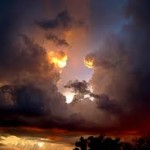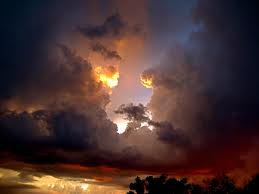- You are here:
- Home
- Essays
- The Ordinary Supernatural

 By definition, ‘Supernatural’ is something that is ‘not natural’ – something that is not a part of nature. When we skeptically think of the supernatural, concepts such as God usually come to mind – things that, if they are to be believed at all, must be taken ‘on faith’ because we cannot test, touch or otherwise empirically ‘prove’ their existence or qualities. And because we by definition cannot empirically prove it, many conclude that the Supernatural does not exist – but is this a premature conclusion? Is it possible to ‘know’ that the Supernatural does indeed exist? Is it possible that the ‘Supernatural’ is right in front of our eyes every day? I believe it is – in fact I believe that all of nature itself is based upon the existence of the Supernatural.
By definition, ‘Supernatural’ is something that is ‘not natural’ – something that is not a part of nature. When we skeptically think of the supernatural, concepts such as God usually come to mind – things that, if they are to be believed at all, must be taken ‘on faith’ because we cannot test, touch or otherwise empirically ‘prove’ their existence or qualities. And because we by definition cannot empirically prove it, many conclude that the Supernatural does not exist – but is this a premature conclusion? Is it possible to ‘know’ that the Supernatural does indeed exist? Is it possible that the ‘Supernatural’ is right in front of our eyes every day? I believe it is – in fact I believe that all of nature itself is based upon the existence of the Supernatural.
Why? Because everything ‘natural and evidential’ breaks down eventually into something that is not explainable by natural causes. Everything! Let me give you an example. A few years ago I was explaining to my youngest daughter how the light in the living room works. I had watched her grow in her discovery of knowledge, and finally one day on her own she equated the bright light in the middle of the ceiling with a properly positioned switch on the wall. For about a year, that switch was all she needed to ‘know’ about light – this knowledge took care of her need for shedding light in the room and that’s all she needed to know. She clearly had incomplete knowledge – but it was sufficient for her to get about her life everyday.
To the electrician who understands the nature of electricity she must seem youthfully naïve when he hears her confident explanation of the functionality of light. But then even the electrician’s knowledge – which sustains his livelihood with his level of knowledge of electricity, is incomplete when compared to the nuclear power plant engineers and then the quantum physicist. But the quantum physicist lives at the base of electrical knowledge, and even he must admit that he cannot explain fully what or why. For example, in quantum mechanics a photon appears to have properties of both a particle and a wave– but how can that be? He doesn’t know – but he knows enough about the results of what happens to be able to design nuclear power plants and light switches with confidence. We can know what happens, but we don’t know why.
Now I don’t often contemplate the maddeningly complex issues of chaos theory, Heisenberg uncertainty principles and dark matter when flipping on the light switch, but they are there at the base of our knowledge, and they are unexplainable to our current models of physics.
But does this make it ‘supernatural’? The skeptic would simply say that we just don’t know enough about nature yet. Perhaps the grand unified theory will emerge and answer all our questions. But, even if it does it will not explain the eternal question ‘Why?’.
All that these laws of physics do is explain the nature of physics. They cannot by definition explain the laws themselves. Where did the laws come from? Can they be eternal? Can they be self-generating? No – we see no evidence of an eternity past, and it is philosophically impossible (because if there was an infinite set of seconds behind us we would never get to now.) And we see the evidences of a beginning to time and space in front of us every day in cause and effect, the second law of thermodynamics, and the expansion of the universe.
Add to this the interesting qualities of concepts like color, time, and numbers. Is something red when light is not shown upon it? Is it still red if it appears gray to someone colorblind? This shows us that red is a concept, not a physical state. It is something that a physical phenomenon matches up to. The same is true of numbers (in counting to three we conform to the concept of three) and of emotions such as love or hate (we certainly cannot weigh love!)
Perhaps our initial knee-jerk negative issues with the knowledge of the Supernatural are found in the concept of the word ‘knowledge.’ The study of how we know what we know is called Epistemology – and it gets quite weird really fast. This is the venue of questions such as “If a tree falls in the forest does it make any noise?” which are tricky to answer, because we just ‘know’ from our experiences that falling trees make noise – but if no one is there to hear it then you by definition you cannot ‘prove’ it. Some argue that this particular problem is in the definition – that noise is only noise if it is heard by something – but does this satisfy our curiosity? Does this absence of evidence somehow negate what we think that we ‘know’ from our experiences – that the physical laws of the universe cause sound waves when there is a collision, and don’t seem to be contingent upon whether we’re there or not? Or can we apply the experiential evidence we see (and hear!) every day to that which we cannot see and hear, and trust in the knowledge being accurate.
“Trust” is the key word – and is in fact the most accurate definition of the words ‘belief’ and ‘faith’. It is by trust that my daughter lives in the world of quantum mechanics; it is by trust that you and I live each day in a world of uncertain knowledge – that the cook that prepares my food is handling it properly; that the pilot of the plane I am boarding is competent; that the driver approaching me will stay on his side of the road; that my wife truly loves me, etc. etc. etc.
So – it appears we do in fact live everyday with the reality of incomplete and unknowable knowledge. And it appears that the concepts of numbers, colors, love, and the source of physical laws themselves are all in the realm of the Supernatural. We do indeed live in a ‘Supernatural’ world every moment of our lives – and we do quite well – therefore we shouldn’t have such a problem with the concept.
The most interesting aspect of the Supernatural is the obviousness of the qualities of God. We are told in Romans 1:19-20 that “God’s invisible qualities – His eternal power and divine nature – have been clearly seen, being understood from what has been made…” How can the invisible be clearly seen? We can see it with the eye of the mind, which is confirmed by the observance of the evidence of the Supernatural that is in front of us every day. We saw that there cannot be an actual infinity in the natural world – so there must be something that started it all off that is outside of time – the real definition of eternal. And His independence from the creation displays His divine nature – He is beyond us; His nature is not like ours – and this is described perfectly as the “I am that I am.”
But I left off the last part of the verse above. It concludes that God put all this evidence in front of us “…so that men are without excuse.” This means that when one says “God you did not give me enough evidence” He will simply say “My child, the evidence of the Supernatural was in front of you every day.”